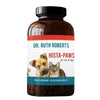Fleas are not just a nuisance; they can cause serious health issues for pets. Flea infestations can lead to skin infections, allergic reactions, and even transmit diseases. To protect their furry friends, pet owners often turn to flea control products. However, the question remains: Are these products safe for your pet? This blog delves into the safety of flea control products and offers guidance on choosing the best options for your beloved animal.
Types of Flea Control Products
- Topical Treatments: Applied directly to the pet's skin, these products contain insecticides that kill fleas on contact.
- Oral Medications: Given as pills or chewables, these treatments work from the inside out, killing fleas when they bite the pet.
- Collars: Infused with insecticides, flea collars provide long-term protection by releasing the active ingredients over time.
- Sprays and Powders: Applied to the pet's coat, these products kill fleas on contact and provide short-term protection.
- Shampoos: Used during bathing, flea shampoos kill fleas on contact but do not provide lasting protection.
Understanding the Risks of Flea Control Products
Take a moment to read the ingredients label on your pet's flea control product. You might be surprised at the number of chemicals listed. Both oral and topical commercial products often contain substances that could make your pet sick or even harm you and your family.
Risks to Your Family
Topical flea control products pose the highest risk of cross-contamination. Young children are particularly vulnerable as they love to pet and hug their furry friends. Even after several hours, the chemicals in these products remain on the animal's fur and skin and can be transferred through simple physical contact.
Oral flea control products aren't much safer. While they pose less immediate contact risk, the chemicals still pass through your pet's stomach, liver, and other vital organs. These toxins can then be transferred to human family members through physical contact.
Risks to Your Pet
Short-Term Health Risks: Many flea control products contain chemicals that can cause immediate adverse reactions in pets. Symptoms such as vomiting, diarrhea, skin irritation, and lethargy are common shortly after application or ingestion of these products.
Long-Term Health Risks: Prolonged exposure to these chemicals can lead to more severe health issues in pets. Research has shown links between certain flea control chemicals and long-term conditions such as cancer, seizures, and neurological disorders.
Harmful Chemicals in Flea Control Products
Many flea and tick control products contain harmful chemicals and toxins. Here are some of the most concerning:
Imidacloprid
Imidacloprid is found in many pest preventatives and over 400 household products. According to the Natural Resources Defense Council, this chemical has been linked to some cancers and reproductive issues in lab mice . Popular products containing imidacloprid include K9 Advantix II and Advantage II.
Fipronil
Fipronil is another common ingredient. It kills adult fleas, larvae, chewing lice, and ticks but can cause hormonal disruption, heart arrhythmia, dermatitis, and is considered a possible human carcinogen . Frontline is a widely used pet product containing fipronil.
Isoxazoline
The FDA recently issued a warning about isoxazoline, found in products like Bravecto, Nexgard, and Simparica. Pets using these products have experienced adverse neurological effects such as muscle tremors, ataxia, and seizures .
Other dangerous but common insecticides in flea and tick preventatives include permethrin, pyriproxyfen, methoprene, and other aryl heterocycles. These chemicals carry risks for both pets and humans, including cancer .
Safe Alternatives
The key takeaway is to be informed, not afraid. Always read the labels on any products you bring into your home, especially those for your pet. Some pets are more sensitive to certain ingredients, so consulting a natural or holistic veterinarian can provide you with safe alternatives for pest control.
Research-Based Safe Alternatives
- Diatomaceous Earth: A study published in the Journal of Medical Entomology found that diatomaceous earth is effective in controlling flea populations without harmful side effects .
- Neem Oil: Research indicates that neem oil has natural insecticidal properties that can effectively repel and kill fleas and ticks .
- Essential Oils: Certain essential oils like lavender and eucalyptus have been shown to repel fleas. However, it's crucial to use them correctly as some essential oils can be toxic to pets .
There are many ways to keep your pet free of fleas and ticks without exposing them to harmful chemicals. For safe options, check out my blog post on "6 Safe Flea Treatment Options for Your Pet and Home."















